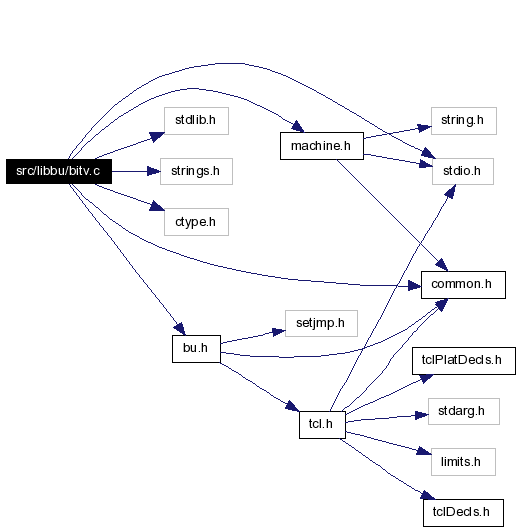
#include "common.h"
#include <stdio.h>
#include <stdlib.h>
#include <strings.h>
#include <ctype.h>
#include "machine.h"
#include "bu.h"
Include dependency graph for bitv.c:

Go to the source code of this file.
Functions | |
| bu_bitv * | bu_bitv_new (unsigned int nbits) |
| Allocate storage for a new bit vector of at least 'nbits' in length. For efficiency, the bit vector itself is not initialized. | |
| void | bu_bitv_free (struct bu_bitv *bv) |
| Release all internal storage for this bit vector. | |
| void | bu_bitv_clear (struct bu_bitv *bv) |
| Set all the bits in the bit vector to zero. | |
| void | bu_bitv_or (struct bu_bitv *ov, const struct bu_bitv *iv) |
| void | bu_bitv_and (struct bu_bitv *ov, const struct bu_bitv *iv) |
| void | bu_bitv_vls (struct bu_vls *v, register const struct bu_bitv *bv) |
| Print the bits set in a bit vector. | |
| void | bu_pr_bitv (const char *str, register const struct bu_bitv *bv) |
| Print the bits set in a bit vector. Use bu_vls stuff, to make only a single call to bu_log(). | |
| void | bu_bitv_to_hex (struct bu_vls *v, register const struct bu_bitv *bv) |
| Convert a bit vector to an ascii string of hex digits. The string is from MSB to LSB (bytes and bits). | |
| bu_bitv * | bu_hex_to_bitv (const char *str) |
| Convert a string of HEX digits (as produces by bu_bitv_to_hex) into a bit vector. | |
| bu_bitv * | bu_bitv_dup (register const struct bu_bitv *bv) |
| Make a copy of a bit vector. | |
The basic type "bitv_t" is defined in h/machine.h; it is the widest integer datatype for which efficient hardware support exists. BITV_SHIFT and BITV_MASK are also defined in machine.h
These bit vectors are "little endian", bit 0 is in the right hand side of the [0] word.
Definition in file bitv.c.
 1.4.6
1.4.6